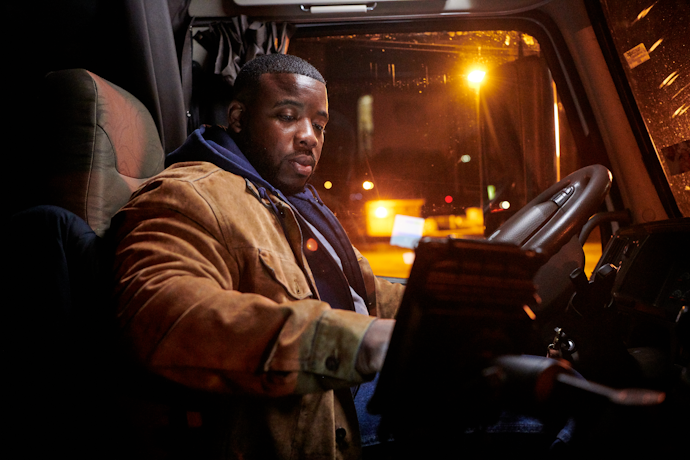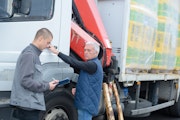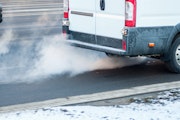How smart video fuels smart business
Learn how innovations in video powered by AI and machine learning are helping to reshape safety and efficiency.
Read more
With the final Electronic Logging Device (ELD) mandate in place, we're answering some of the most frequently asked questions about ELDs and sharing implications for fleet managers and drivers, including exemptions to the rule and more. Read on for the most frequently asked ELD questions and answers, and click here for more information about the topic that is top of mind for the fleet industry right now.
Q: What is an ELD?
A: ELD stands for Electronic Logging Device. This device is connected to a vehicle to automatically record driving hours for the purpose of preparing Hours of Service (HOS) reports—also known as RODS (Record of Driver Status). These devices must meet specific criteria outlined by the Federal Motor Carrier Safety Authority (FMCSA) under the ELD mandate.
Q: What is the ELD mandate?
A: ELD mandate is the final ruling from the FMCSA on the electronic logging requirements for CMV (Commercial Motor Vehicle) drivers who are required to comply with HOS limits.
The mandate includes:
Q: To whom does the ELD rule apply?
A: The ELD rule applies to most motor carriers/drivers currently required to maintain RODS in the U.S., and to Canada- and Mexico-domiciled drivers. In general, if a commercial vehicle requires a USDOT number, it also needs an ELD. This includes vehicles that have a gross vehicle weight greater than 10,000 lbs., those are used for transporting products or people for interstate business and those that transport regulated hazardous goods.
Q: Does the carrier have to register the ELD with the FMCSA?
A: No, this is handled by the ELD provider.
Q: Are there exemptions to the ELD mandate?
A: Yes, there are a few ELD compliance exemptions in which drivers can continue maintaining a paper log book. For example, drivers who operate less than eight days out of a 30-day period can use paper RODs. Those who conduct a drive-away-tow-away operation and drivers of vehicles manufactured before the model year 2000 are also exempt from ELD compliance.
Q: What sort of training will drivers need in order to use ELDs?
A: The Logbook app is easy to use and comes with training and support resources to help Drivers successfully operate the ELD. The online tutorial is available in English and Spanish and walks drivers through the components of the app. It covers all the daily tasks such as certifying logs, accepting admin-proposed changes and completing a vehicle inspection report. The Help Center is accessible directly from within the Logbook app to answer Driver questions. It also contains the latest user guides that can be downloaded and shared with Drivers.
Q: Are ELDs expensive? Do I have to pay upfront?
A: The good news is that ELDs are not only cost-effective, their benefits often result in a positive return on investment for the companies using them within just a few short months. Verizon Connect has partnerships with several light duty and heavy-duty truck makers that allow drivers to have the necessary ELD hardware pre-installed in new vehicles. This means there are no extra hardware costs; they can simply activate the account online and can start using the ELD right away. Other hardware options are a few hundred dollars per vehicle plus a regular service fee.
Q: Which key performance indicators (KPIs) should I use to measure ELD success?
A: While ELDs are primarily aimed at helping drivers comply with HOS requirements, it’s a perfect opportunity to start measuring other performance metrics. For example, ELDs can help pinpoint hidden operational costs as well as uncover areas where driver coaching may be needed, including:
Q: Is an ELD safe for a driver to use?
A: Absolutely. The evidence that ELDs can actually improve driver safety is growing. In fact, research has shown that trucks equipped with an ELD reduced their total crash rate by 11.7% and lowered their preventable crash rate by 5.1%.1 While drivers may still need to identify special driving categories such as yard movements or personal conveyance, other distractions are reduced significantly so that drivers can focus on what they do best: drive.
Q: How can I use an ELD to track KPIs?
A: Some ELD providers offer web-based fleet management software that allows fleets to set up custom dashboards to measure specific KPIs across divisions, teams and regions, all in real time.
Q: Does a driver still need to have a paper log book in the truck even though they have an ELD?
A: Yes. Drivers are required to have a paper log book in the vehicle at all times. This is used if the ELD malfunctions. Drivers must also make any supporting documentation in their possession available to an authorized official.
Find out more about how the right ELD technology can benefit your business.
Tags: Billing & Invoicing, ELD & Compliance, Productivity & Efficiency




Find out how our platform gives you the visibility you need to get more done.
Learn how innovations in video powered by AI and machine learning are helping to reshape safety and efficiency.
Read moreAre you ready for vehicle tracking? Go through our checklist to learn the signs you’re ready to add fleet tracking to...
Read moreLearn how AI, machine learning, and predictive analytics is improving fleet accurating and cutting costs.
Read moreLearn how telematics can lead to operational improvements.
Read more